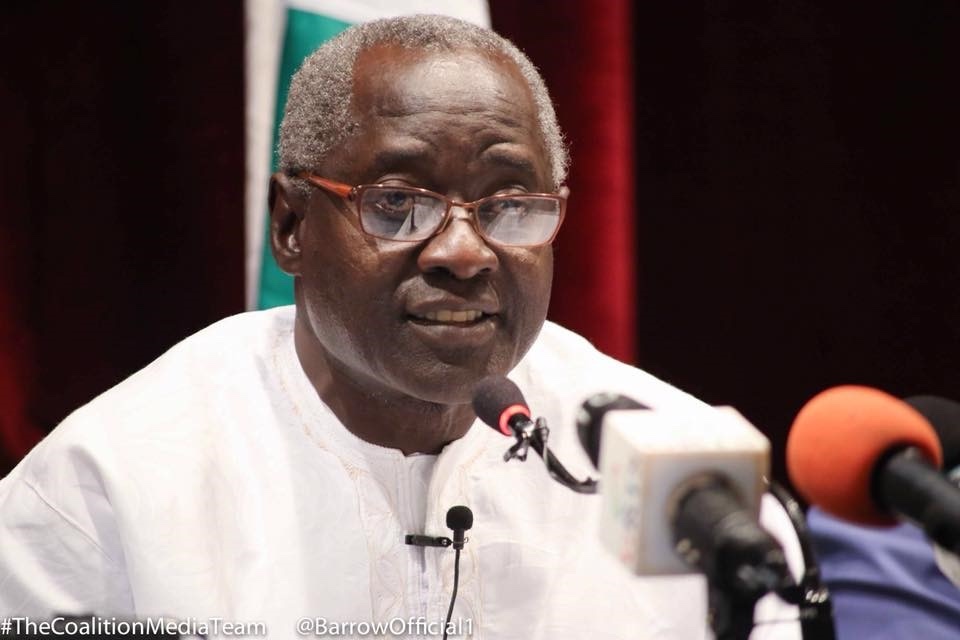Halifa Sallah on Draft Constitution: “That Consultation Did Not Take Place”

By Buba Gagigo
Hon. Halifa Sallah, the leader of The People’s Democratic Organisation for Independence and Socialism (PDOIS), has stressed the importance of forming a constitutional review committee. This committee would explain the 1997 constitution and the Constitutional Review Commission (CRC) draft to the public, gather feedback, and provide a detailed report to both the executive and Parliament during a national validation exercise.
At a press conference on Wednesday, Sallah highlighted the current constitutional deadlock. He noted that instead of forming a review committee to engage with the public, explain the 1997 constitution and the CRC draft, and gather opinions to report back to the executive and Parliament, the state simply published a draft. “That consultation did not take place,” Sallah remarked. “They brought a draft, published it, and that draft is now in the public space.”
“That is where we are at the moment, a constitutional impasse, where instead of recommendations were given, instead of the state constituting a constitutional review committee that will talk to everybody again, explain the 1997 constitution to people, explain the CRC draft, and then seek opinion, provide report to the executive, as well as to Parliament and the public at large in a national validation exercise, and then we agree on what procedure and what content we are going to work on to bring about a constitution of the 3rd Republic. That’s what consultation should have given rise to. That consultation did not take place. They brought a draft, published it, and that draft is what is now in the public space,” said Halifa Sallah.
Sallah raised critical questions about the draft released by the executive. “What are we to do with it? After three months, the bill will be published again for the second time, and then it will be brought to the National Assembly for the first reading, followed by the second reading. What will the National Assembly members do? If we don’t want it, how do we show that?” he questioned.
“What are we to do with it? That is the question. The inevitable is what we are here to tell you, it is inevitable that after three months, that bill will be again published for the second time, and after that, it will be brought to the National Assembly for the first reading. After that, it will go to the second reading. What are the National Assembly members going to do? If we say we don’t want it, How do you show that you don’t want it? That’s the question,” Halifa Sallah said.
He further explored the consequences of rejecting the proposed constitution. “When we say knowledge, that is what it requires to know what should happen. And no Gambian should be in the dark about this. What we are out to tell you is that if they bring this bill to the National Assembly, it will have to go to the second reading. Yes, at the second reading, the National Assembly members could say, No, we don’t support it, and it will be dead, just like the CRC bill. That’s one thing that could happen. Is that what should happen? Would that be a sign of really being sovereign? What is being sovereign is having the authority and power to do something.”
He stressed that the executive lacks the sovereign authority to enact the constitution of a Third Republic, asserting, “They don’t have responsibility. They just have the right to propose full stops. It is the National Assembly members who have the right to dispose of the bill. They are the ones who can say that what is there can be changed. So therefore all Gambians should be reviewing this bill. Review the CRC draft. You may even accuse them of plagiarizing in the 1997 constitution, or the CRC, accuse them of anything you wish. You may accuse them of not consulting whatever you wish to say, you have freedom of speech, freedom of opinion, to express your dissatisfaction with action that has been taken.”
He concluded by urging Gambians to read and understand the documents thoroughly. “But principally, if you want to have a mature opinion, you must read and understand all these documents, and ask yourself which clause is inclined with the interest of the Sovereign People of the Gambia? Which clause should be seen to be fit to be in the constitution of a sovereign Republic? And then that’s what the National Assembly Members should be told, and that’s what they should argue, and that’s what they should consider should be in that provision, or they will reject, whatever is there that they do not approve of.”


Comments are closed, but trackbacks and pingbacks are open.